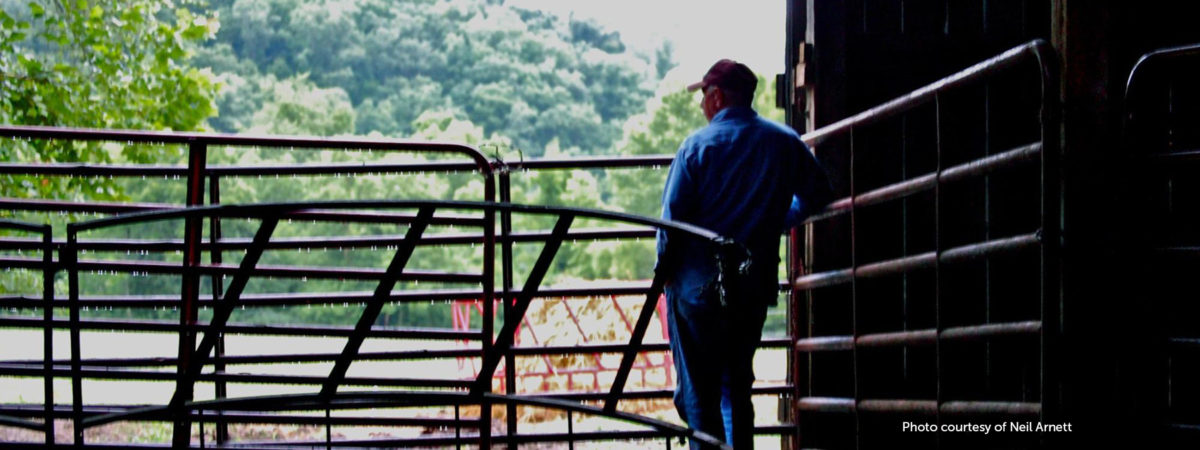
“There was a maker and problem-solving culture I was exposed to growing up, even though we didn’t know to call it that.” - Neil Arnett

Photo courtesy of Neil Arnett. Neil Arnett in 8th grade, standing in front of a portable meat smoker he helped his father and his father’s friends build, to be able to cook for the community.
This is one of the many examples of “Appalachian Ingenuity,” or stories of local problem-solving and innovation. The “coal scoop,” a machine that replaced horses and mules to transport coal outside of the mines, which is now used all around the world, even in contexts outside of mining, was invented by a man in Eastern KY (Martin, KY to be exact). A NASA engineer who visited Eastern KY once remarked that technologies in the coal mines were equivalent to those used at NASA. Currently, an Eastern KY high school incorporates workforce readiness into its normal high school curriculum. There, an English teacher assigns sections of the Occupational Safety and Health Administration (OSHA) manual so that students are learning about grammar and sentence structure while also learning content extremely pertinent to their future careers. Many students graduate with certificates in fields such as welding and automotive mechanics that allow them to begin their careers straight out of high school. This strong focus on career readiness outside of college provides real-world skills and opportunities to these students.

Photo courtesy of Neil Arnett. Young Neil Arnett and his father in front of a workshop they were building using recycled home improvement store shelving as the wall. The piece of equipment in the foreground was modified to lift hay with the back of the tractor with the added benefit of being able to tilt and put the hay in the cattle feeder.
These stories of ingenuity matter. They certainly matter to the local East KY Appalachia community, but they also matter nationally, as these Appalachia communities challenge the long-held assumption that technical creativity and innovation in this country are largely limited to the confines of California’s Silicon Valley and the northeast United States. Perhaps this assumption is no more evident than with the persistent migration (40+ years now) of young, educated workers from this country’s rural areas to move to larger cities and attempt to secure jobs in high tech companies. Certainly, the recent spread of broadband access within rural communities helps to level the playing field a bit, but rural America is still collectively challenged by the assumption that where they are at is not “where it’s at”.
Education leaders at Pikeville Independent and neighboring Floyd County Schools face this challenge daily, and they want to challenge this perception, especially among the communities’ youngest learners. These leaders notice that some younger students starting school, including Neil’s own children, do not have that same exposure to seeing adults they know identify creative solutions to problems in their world. This may have to do with a variety of reasons, including the collapse of the coal industry, as those with engineering and building expertise relocated, and the increase in modern conveniences, such as the internet.

Photo courtesy of Neil Arnett. Neil Arnett at his father’s farm, in October 2022, sitting on equipment that combines an early 20th century horse-drawn disc harrow with a 21st century John Deere tractor pulled version.
These leaders believe that connecting to the “maker and problem-solving culture” of Eastern KY is what is very much needed for the younger generation today. A new research practice partnership grant from the National Science Foundation, coordinated by Digital Promise, will help Pikeville Independent and Floyd County Schools do just that. Over the next three years, the project will support small teams of teacher-leaders at Floyd and Pikeville to create, implement, study and refine computational thinking (CT) lessons that are connected to their local cultural heritage of problem-solving. The project will also support the districts to host parent nights and a student project showcase that reinforce connections between CT education, local needs and heritage. The project is a collaborative partnership with the educators mentioned in this article, Digital Promise researchers, and community partners such as Bit Source, ThroughlinesEdu, local storytellers, CT educators in Pittsburgh (PA), regional workforce development organizations and the Student Technology Leadership Project State Coordinator at the Kentucky Department of Education.
The project builds on a previous National Science Foundation funded effort to begin K-8 CT pathways in the districts, which has resulted in CT pathway curriculum maps, and well-trained and enthusiastic teachers.
The initiative has been inspired by–and connects with–a range of interventions in KY to imagine the future of work in the state and build a stronger ecosystem for fostering innovation, through the support of Kentucky-based nonprofit AccelerateKY. See more about the genesis of these efforts from our 2018 and 2022 SXSW sessions. It builds on methodologies being developed by other researchers who have been involved in supporting these efforts in KY–in particular, the civic imagination workshops for University of Southern California’s Civic Imagination Project and the co-creation approaches of the MIT Open Documentary Lab.
What makes this new project so exciting is its explicit connection to supporting and sustaining rural culture and community.
Mike Bell, an administrative leader on the project from Floyd County Schools shared, “I’m so excited. This new project is an opportunity for students to learn about who they are, learn about their community, and also change their community.”
The authors would like to acknowledge and thank Carly Chillmon and Gabrielle Lue for their editorial support and guidance, as well as Neil Arnett, Mike Bell, Sam Ford, Elon Justice, and Rusty Justice for contributing valuable content to this blog.
This material is based upon work supported by the National Science Foundation under Grant No. 2219401. Any opinions, findings, and conclusions or recommendations expressed in this material are those of the author(s) and do not necessarily reflect the views of the National Science Foundation.